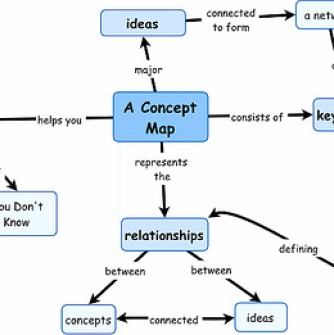Salem State University will remain closed for evening classes on Tuesday, January 27. Only essential designated personnel should report to work as scheduled.
Concept Mapping as a Pedagogical and Assessment Tool
| Contact |
Derek A Barr
|
|---|
What is a concept map? Simply put, a concept map is a pedagogical or assessment tool used to achieve or evaluate student learning outcomes. Most educators will agree that a student’s ability to pass an examination has limited value in terms of truly assessing achievement of learning outcomes. In addition, traditional examinations do not allow educators to fully engage students in self-directed approaches to learning. Concept Maps, mind maps, care maps….the names of these pedagogical tools may differ but their purposes are the same: to promote or assess meaningful student learning.
Based on the cognitive psychology of Ausubel (1963) who clearly distinguished between rote learning and meaningful learning, concept maps evolved through research exploring young children’s mastery of science over time (Novak & Gowin, 1984). The simplicity of concept maps in creating frameworks of powerful knowledge that allow students to use that knowledge, not only in the moment, but also long-term, is often surprising to both learners and teachers (Novak, n.d.).
Further, concept mapping can be a useful tool in assisting students to capture the transfer of knowledge from theory to practice (Atay & Karabacak, 2012). In applied disciplines such as nursing education, students encounter complex clinical situations involving the health and well-being of others. Learning how to apply new knowledge and expand existing knowledge to problem solve in unfamiliar clinical environments can be overwhelming. Therefore, at Salem State University in the department of nursing, this innovative teaching method is being used to encourage students in women’s health, pediatrics, and public health nursing to think conceptually.
Strong proponents of concept mapping as a learning tool, Professors Charlene Moske-Weber and Donna Hills in the department of nursing are using concept mapping to teach and assess their students. Required to complete two concept maps (one surrounding a pediatric concept and another surrounding a concept related to Women’s Health) each semester, students are free to choose which concepts they map and are encouraged to choose those that challenge them most. Moske-Weber and Hills believe that along with developing soft skills such as independent learning, concept mapping allows students to identify specific learning needs and use their own creative strategies to complete them. Curricular freedom such as this can be empowering to students (Broom, 2015).
Promoting use of technology in the nursing classroom, faculty provide students with a concept map template to complete the concept maps. Incorporating numerous aspects of professional nursing care including assessment, collaboration, cultural considerations, delegation, and safety, the concept map template allows students to add other conceptual perspectives associated with their topic of interest. While some students use and expand this template, others opt to use free online software to create their maps, links to which are provided below. Others create the concept map on a power point slide. And still a few students choose to submit poster style concept maps created by hand, eliminating any concerns related to technological access or proficiency.
In her work with students with accelerated bachelor degree seeking nursing students, Moske-Weber also uses concept mapping as a form of learning assessment. As opposed to a traditional multiple-choice examination, students in her Women’s Health nursing class are assigned four concept maps to complete over the six week quarter course. While one of the maps is completed in class as a group, the other three concept maps are assigned bi-weekly. Students are encouraged to choose a concept related to weekly course content that they feel personally challenges them. Following review by faculty, students are encouraged to share their concept maps with one another on the course web site encouraging collaboration and a team-based approach to learning.
Not surprisingly, student feedback has been overwhelmingly positive. Along with purporting concept mapping expanded their critical thinking ability and helped them apply old and new knowledge, students also claimed concept mapping made learning fun and effective. Perhaps most impressive, the nursing students maintained concept mapping prepared them for future clinical decision making and allowed them insight into the holistic aspects of nursing care.
According to Jaafarour and colleagues (2016), as a teaching strategy, concept mapping not only positively affects students’ academic success, but can also serve as a significant predictor of their scores on future tests. In light of the requirement of many students to pass licensing exams upon graduation, those teaching in applied and other disciplines may find sharpening their knowledge of concept mapping beneficial. Particularly when one considers the prospect of graduating students better prepared for future clinical decision making and cognizant of the holistic aspects of caring for others. Could we want for anything more?
Care to learn more about concept mapping? Dr. Moske-Weber and Dr. Hills are available for consultation on concept mapping and how to integrate it into your classroom. They may be reached at cmoskeweber@salemstate.edu and dhills@salemstate.edu.
References
Atay, S., & Karabacak, Ü. (2012). Care plans using concept maps and their effects on the critical thinking dispositions of nursing students. International Journal of Nursing Practice, 18(3), 233-239. doi:10.1111/j.1440-172X.2012.02034.x
Ausubel, D. P. (1963). The psychology of meaningful verbal learning. New York: Grune and Stratton.
Broom, C. (2015). Empowering students: Pedagogy that benefits educators and learners.
Citizenship, Social and Economics Education, 14(2), 79-86.
Jaafarpour, M., Aazami, S., & Mozafari, M. (2016). Does concept mapping enhance learning outcome of nursing students. Nurse Education Today, 36,
129-132. doi:10.1016/j.nedt.2015.08.029
Novak, J.D. (n.d.). The theory of concept maps and how to construct the. Retrieved from
http://web.stanford.edu/dept/SUSE/projects/ireport/articles/concept_maps/The%20Theor y%20Underlying%20Concept%20Maps.pdf
Novak, J. D., & D. B. Gowin. (1984). Learning how to learn. New York: Cambridge University Press.

